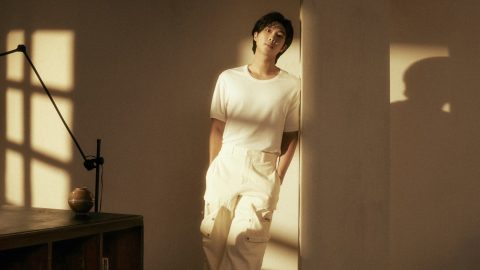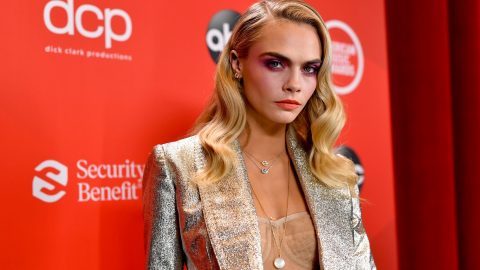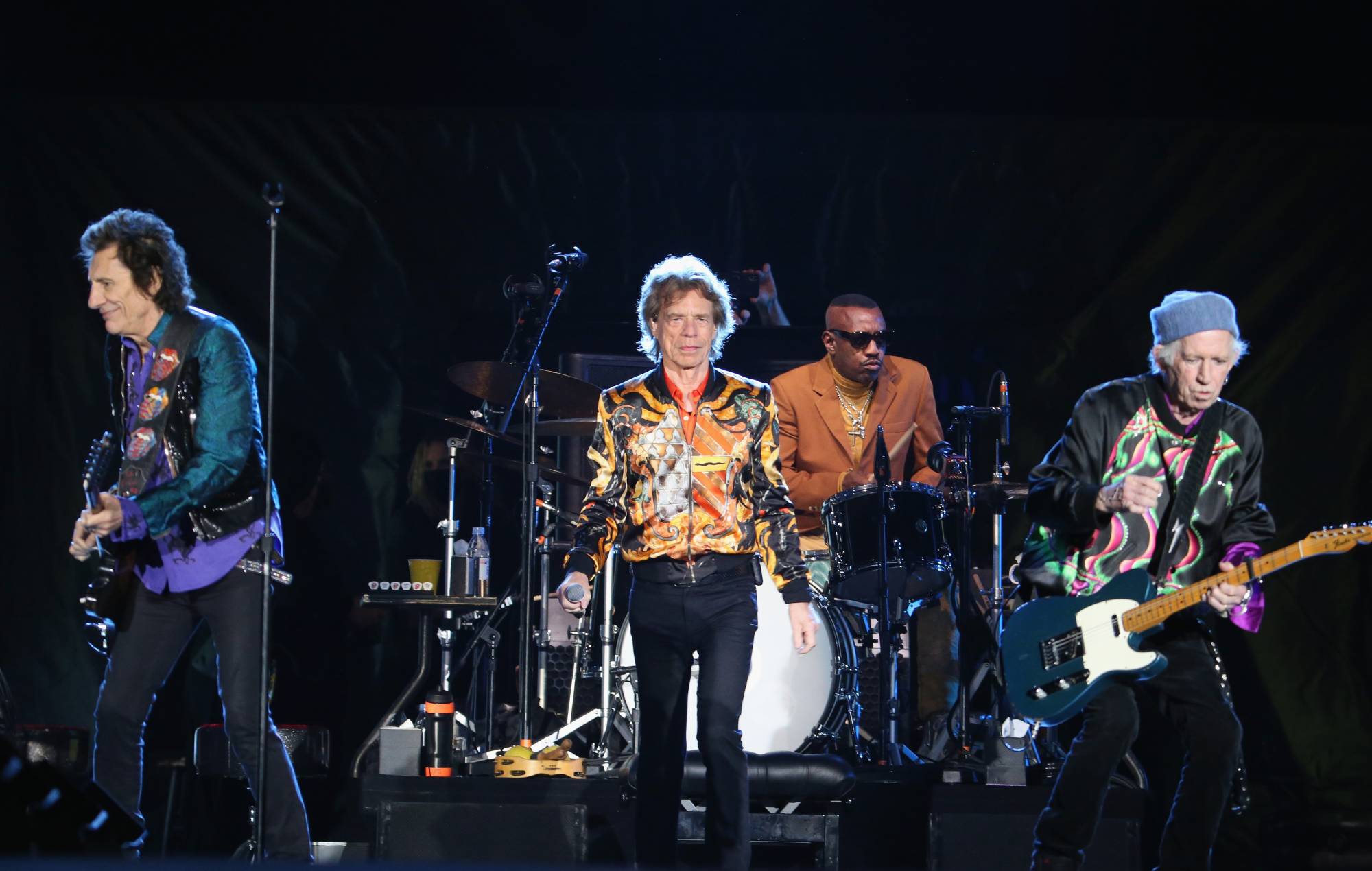
“I’m getting a fucking massive tattoo later today,” Yungblud whispers to NME. As he traces a large, rectangular shape down the left side of his ribcage, his eyes flash with anxiety, although a mischievous smile plays across his lips. “It’ll spell out my personal manifesto: Never compromise, imperfection is perfection, embrace the strange, never judge…” He says each word slowly and precisely, like water drops falling from a tap. “Tell the truth, pink socks, beer… move.”
As we climb over the mini mountains of instruments that populate his north London rehearsal space, carefully and patiently as though we’re navigating a maze of laser beams together, the artist, born Dominic Harrison, anxiously awaits our feedback on his tattoo proposal. When we nod approvingly, the 24-year-old excitedly cheers, before wielding a slightly battered guitar – cloaked in a suspiciously dark red stain – in our direction. “I know what you’re thinking – it’s not blood,” he exclaims, before a crackling laugh sneaks out. “I had a disaster with some hair dye…”
Freshly-dyed hair intact, Harrison is preparing to get inked in honour of his forthcoming self-titled third album (due September 2). The tattoo will be broadcast via an Instagram Live, in which he’ll announce the record to his fanbase – known as BHC, or the Black Hearts Club – in an effort to “bring [his] community together”.

For Harrison, today is a “pinch-me moment” – but he’s been having plenty of those lately. Take ‘Tissues’, a swelling highlight on ‘Yungblud’, which samples The Cure’s 1985 hit ‘Close To Me’: “I emailed Robert [Smith], my hero, and asked him if I could use the song. It was huge; he is the reason why I look the way I look,” he says, referring to their shared affinity for gothic, heavy eye makeup. “I truly believe that there are classic songs on this album, and this one feels like a real statement of togetherness.”
Harrison’s music – a raw, vibrant blaze of pop-punk and rock sounds – has long expressed how he finds strength in numbers; “It’ll be alright / “We’re in a weird time of life,” he sang on the title track of his second record, 2020’s ‘Weird!’. When that album topped the UK Charts, Harrison honoured the BHC’s fandom by melting his #1 Award into 150 safety pins, which were sent out to close, long-standing supporters.
The brazen and personal impact that Harrison has had on his now-millions following means that the traditional barriers between a megastar and those who follow his adventures from afar have been eroded. Since the release of a self-titled EP in 2018, he has said that his devotees are why he does what he does: “I am a vehicle for other people’s expression – the fans have stuck with me, as I fight for them,” he says today. Yet as a young artist who has grown up online, they’ve also been able to analyse his every move. “But other people have been watching me with a microscope, waiting for me to slip up.”

For Harrison, this feeling of living as though he’s constantly walking on a tightrope informs ‘Yungblud’. As he has gone from a feverish punk fan growing up in Doncaster to a global superstar with multiple NME Award nominations to his name, Harrison has become an essential deity to a million teenagers around the world, thanks to his vocality on the things that matter to him: LGBTQ+ rights, mental health awareness, and decrying both gun and sexual violence.
During his main stage Reading Festival slot last year – “I’m going to headline that festival one day” – he kissed his guitarist on stage in front of a packed field of fans, proving that both his extreme confidence and proud nonconformity have long been his appeal for many – but not all. “[Backstage], even Liam Gallagher turned around to me and said, ‘You’re a little bit fucking gobby, aren’t you?’, he says as we settle into a café down the street. “I told him, ‘Yeah, I fucking am!’”
But hold on, Harrison thought, that hasn’t always been his aim. He wanted his passionate, larger-than-life personality to accentuate the youthful vitality of his music, not drown it out. “I am everything people hate. I’m loud, I speak my mind and I tell the truth, no matter what,” he declares. His conversation is full of this firm, slightly defensive emphasis. “And you know what? I’m a cocky little shit, too.”
“People have been watching me with a microscope, waiting for me to slip up”
Harrison decided to treat the new album as a blank slate; whenever he veered too close to the sound that gained him praise in the past, he tripped himself up. The giddy mishmash of emo and ska-flavoured guitars for which he had become known for have been swapped out for stomping, classic rock stylings, while his voice has matured to a growl, rich in colour and fierce emotion. “The name Yungblud, as it’s gotten bigger, has been twisted relentlessly as every single person has had an opinion on who I am,” he says. “This album is not a ‘woe is me’ rockstar story; it’s about me reclaiming my own name, and humanising the caricature that everybody else has made me into.”
The cover of ‘Weird!’ – which imitated the poster for Shane Meadows’ groundbreaking 2006 drama This Is England – featured Harrison dressed as seven different highly stylised and exaggerated versions of himself: from a ’70s-style Camden Town punk to even two of him kissing. In complete contrast, ‘Yungblud’’s artwork positions Harrison against a plain black backdrop, facing away from the camera, his facial expression sullen and hurt.
With its deliberately unsettling sheen, the choice of image was entirely intentional, Harrison says. “If you were to ask anybody in the street what they thought of Yungblud, they would either say, ‘He saved my life’, or ‘I can’t fucking stand him’. At this point, there’s no middle ground.”

Midway through last autumn’s ‘Life On Mars’ tour, which included a huge, sold-out show at London’s 10,000-capacity Alexandra Palace, a slew of accusations were levelled against Harrison regarding the authenticity of his on-stage musicianship. One Twitter user attempted to call him out by claiming that his guitar wasn’t plugged in during one performance, and that he was miming. Harrison responded with a series of tweets explaining that he had instead been using a wireless guitar that “doubles the bassline [sic] of the song”, and that his guitarist – not visible in the viral clip – was “clearly playing the solo”.
It was not the first social media storm that Harrison unwillingly found himself at the centre of. Following the internet’s discovery that his father once owned a prestigious guitar shop that sold rare instruments to famous musicians including Noel Gallagher and Johnny Marr, a vocal group suggested that he was an ‘industry plant’, and that his family connections played a role in him signing with Interscope Records in 2017.
He found it funny, however, that people believed that his anarchy-adjacent artist image was manufactured by a major label. “It makes me laugh that people are ignorant to the point that they believe that me, Billie Eilish, Olivia Rodrigo, Lil Nas X and so many others are told what to like and what to say,” he says. “Being called an ‘industry plant’ doesn’t bother me, because who decides if an artist is successful or not? The labels don’t; Spotify doesn’t; NME doesn’t. It’s down to the actual listeners.”

Other recent gripes from social media users towards Harrison include his middle class upbringing; spitting beer into the crowd at recent gigs; his fluid choice of fashion and makeup, and using other aspects of queer culture in performative ways. The latter, however, is something that Harrison says has hurt him on a personal level, as he came out as pansexual in December 2020 (meaning he does not recognise gender as part of his attraction to others).
Having moved to London at the age of 16 to study at the fee-paying ArtsEd performance arts school, Harrison points out that he reaffirmed his privilege on the sprightly ‘King Charles’, the first track on his 2018 debut album, ‘21st Century Liability’: “I admit I’ve never been broke but I have been broken,” he sang. “I think I’ve been painted with a brush,” he says with a deep sigh. “So much of what has been said about me has come from a manipulated truth that has blown up on Twitter. I’ve always provided answers for people – and I don’t want to do that anymore.”
He feels as though he has been heavily policed in a way that some other artists haven’t. “Remember when everyone came after me, saying I appropriated the working class? Or when they said I was a queer-baiter? That’s not true; that’s just someone else’s opinion of what I am. It’s like, ‘How dare you question my sexuality on the internet?’”
“Ozzy Osbourne said that he saw a lot of himself in me”
‘I Cry’, ‘Yungblud’’s emotionally charged anthem, tackles the aforementioned accusations head-on. “Everybody online keeps saying I’m not really gay / Start dating men when they go to therapy,” Harrison sings atop glitchy beats and washes of deliberate AutoTune. “And I spend most of my days thinking, ‘What the fuck do they want from me?’”
“In truth, this album gets really dark,” he says. “I’m going to say something a bit strange now…” He repeatedly picks at a plant decoration on the wall next to us, before calling for the café owner to turn down the music playing in the background. A deep silence passes through the room as we wait for the stereo to fade out.
“When everyone was questioning my authenticity, I started to look back at artists like Mac Miller and Lil Peep, because the internet turned on them, too,” Harrison continues. “They built them up, and then fucking tore them down before they passed. And then I got into this place where I thought the best career move would be death.” He pauses. “I thought, ‘If I die right now, would people look beyond a horrible trend on Twitter or TikTok? Would they give me a chance?’” He begins to imagine hypothetical news headlines. “They would say, ‘Ah, isn’t it sad he died? He had so much to say,’ or ‘People judged him’.”

Over time, however, Harrison began to see opportunities to learn from the online ridicule and scepticism. When it comes to his artistic worth, he is now more self-assured: “I know I am the fucking real deal, even though that’s exactly what some people want to hear me say,” he says, before edging closer across the table. “I know what I have to say is from a place of truth. I studied great songwriters like Richard Ashcroft and Damon Albarn, who taught me everything I need to know.”
Harrison goes on to reference the music video for ‘Yungblud’’s lead single, ‘The Funeral’ – an anthem made from Smiths-flecked swirls of rousing guitars – which he filmed with another one of his lifelong heroes, Ozzy Osbourne. In between clips of Harrison performing on stage, the video depicts him digging his own grave, while a stunned Osbourne watches on.
“Being in the studio with Willow was bonkers – but we made a perfect match”
After filming wrapped up, Harrison confided in the Black Sabbath legend about the emotional difficulties he’d faced as a result of the relentless online haters. “I was speaking to him about what happened on Twitter, and he said, ‘If you want to spit beer on the audience, do it, as long as you do it with love,” he recalls. Wise words, perhaps, from a man who wrote himself into the rock history books by once biting the head off a bat live on stage.
Harrison pulls up a necklace from under his t-shirt: it’s a large gold chain with a heavy, diamond-encrusted cross that Osbourne gifted to him. “People think [Ozzy] is kind of… gone, but he’s not. He’s so intelligent and so fucking beautiful. People are scared of him until they hear him speak,” Harrison says. “He said that he saw a lot of himself in me. He said, ‘Never apologise for anything. They will understand you later. Time always tells’.”

When it came to recording ‘Yungblud’, the commercial success of ‘Weird!’ – which has been certified Silver in the UK – afforded Harrison with the opportunity to “get in any studio, with any writers I could have wanted”. But when he started the album in LA last summer, the pressure of being surrounded by a big team quickly got to him; he instead chose to decamp to his London apartment, and work on the record with close collaborators Chris Greatti and Jordan Gable.
The album was eventually recorded at the capital’s legendary Eastcote Studios, which have been used by The 1975 and Arctic Monkeys in the past. It was here where Harrison teamed up with a fellow Gen Z icon, groundbreaking artist and actress Willow Smith – daughter of actors Will Smith and Jada Pinkett Smith – to work on collaborative single, ‘Memories’, which sees their soaring vocals blaze through industrial riffs. “She’s a wildfire spirit,” he says of his friend. “We couldn’t contain our energy together – it was bonkers, but we made a perfect match.” What were they doing to cause such chaos in the studio? Running laps around the vocal booth, naturally.

Working with Willow also enlightened Harrison to a similarity between the pair. “We started to realise that growing up in the public eye, like she and I did, is absolutely crazy,” he says. “But Willow is totally defiant. People need to realise that she hasn’t had it easy [in life], either. Yet she’s grown into a brilliant musician; I think she speaks completely from the heart, but she’s naughty, too. She’s got a bit of bite about her.”
Harrison is keen to explain how he has recently befriended other musicians that he has idolised for years. During lockdown, he was texting Grian Chatten – yet he understands that the reaction from the public towards his friendship with the Fontaines D.C. frontman will be one of surprise.
“All the BBC Radio 6 dads that hate me won’t like the fact that I’m in touch [with Fontaines D.C.]. But I think they are phenomenal. They’re very refreshing and are making exactly the type of music we need to be hearing now,” he says. “People wouldn’t expect us to know each other as we are completely different types of artists; it’s the same with me and Wolf Alice, too. There’s no tension between us – there’s conflict in fandoms instead.”
“I auditioned for Pistol – but I think I was too close in likeness to the band”
It’s almost a wonder that Harrison had time to record ‘Yungblud’, as he has been working on a bevy of extra-curricular projects over the past year. At the MTV EMAs last November, he acknowledged rumours that he’d auditioned to play Boy George in an upcoming Culture Club biopic named after the band’s 1983 hit, ‘Karma Chameleon’. Today, he won’t be pushed on details, but with a knowing grin, he hints that said film is “in the works”.
Harrison’s eyes glow with ambition as he continues to talk about how he wants his two worlds to intertwine once again, having begun his career as a recurring cast member on Disney Channel’s The Lodge. His longstanding dream, he says, has been to play a “Joker-esque character” or another villain, like Batman’s the Riddler, in a DC Comics blockbuster.

One of the first steps Harrison took to develop his music in tandem with acting was auditioning for Danny Boyle’s recent Pistol biopic series. He didn’t get the part, but the experience was “life-changing”, as he explains: “I loved it, but I think I was too close in likeness to [the Sex Pistols]. I think with Danny Boyle, who is such an incredible director, he wanted blank canvases. If I was to play a Sex Pistol, see, there would already be a misconception about how I’d approach [the role].”
Yet Harrison doesn’t have any expectations, or concern, about where his acting pursuits take him in the future – “I’m at ease knowing I don’t have a particular plan,” he says. Instead, music is where he can make sense of his life with immediacy. He is “immensely proud” of ‘Yungblud’, and believes that the album is a document of rebounding from adversity, and reassessing what it is he wants from his career.
“A lot of people ask me, ‘Can you still be Yungblud when you’re 50?’” He smiles, points to his characteristic pink socks, and ends. “Of course. Yungblud has never been about me: it’s about the message.”
Yungblud’s self-titled new album arrives September 2
The post Yungblud: “This album is about reclaiming my name and humanising the caricature” appeared first on NME.




